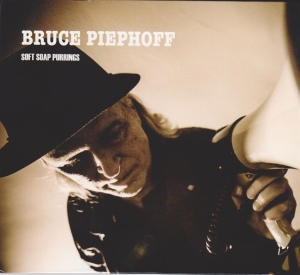I hear soft soap purrings from voices quivering with hate…
I see KKK tatooed on the fingers of a young boy…
I see horse faced evangelists speaking with aplomb…
smell rutabaga black eyed peas and ham on my plate…
I see the idiot boy who saved the day.
Bruce Piephoff’s latest work, Soft Soap Purrings’ eponymous title track is a primer for a richly textured collection. The songs which tumble out of this musical leaving trunk mix deep fried metaphor, descriptions of faces fit for Let Us Now Praise Famous Men, bigotry, idiot boy heroes, the funky perfume of stale beer, and classical literary allusion, all with the well-traveled fearlessness of honest experience.
Soft Soap Purrings contains an encyclopedic mix of musical genres which refuse to stay put in the conventional stylistic constellations. Jazz, folk, Western Swing, bluegrass, and blues spin with each other in easy familiarity, yet with gravity enough to hold the very personal lyrics in their own eccentric orbits. Piephoff is wonderfully well supported by a cast of accomplished players, all of whom offer valuable contributions to the texture and lyricism of the music. Instrumentally notable are Scott Sawyer’s articulate, conversational guitar responses to Piephoff’s lyric call, Aaron Balance’s quicksilver Dobro lines, Pattie Hopkins’ sparrow-quick flights of fiddle, and the warm patina of Claire Holley’s accompanying vocal lines and harmonies. Scott Sawyer’s impeccable ear for tone and space lend the Sawyer and Jason Richmond co-produced project an amber luminescence, aided in that by Gavin Lurssen’s artful and transparent mastering.
The music and this production have a respectful ear for traditional convention but are in no way inhibited by nor tethered to that. Piephoff is not a musical “reenacter” who worries about the musicological authenticity of the buttons on his coat. On Soft Soap Purrings, traditional musical forms and subjects live comfortably with poetic, lyric and musical currency. Much current “traditional” music which reveres and celebrates its past seems, perhaps intentionally, defiantly rooted in that past, with a low-voltage but perceptible, slightly sneering aversion for any hint of the present, either musically or lyrically. Piephoff’s music, his poetry, this production, possess a natural musical maturity that has moved beyond self-consciousness toward the simply, purely musical, not unaware of where it comes from, but not at all a worrying custodian of its history either. Piephoff writes. The material resonates. Good musicians climb on. Every one turns in the same direction. Off it goes…as it should. — Rob Slater (March 2014)

